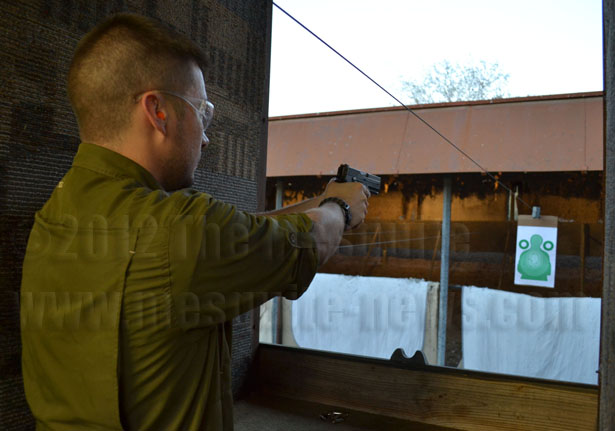
By Laura de Leon and Joseph Camacho
In advance of the 83rd Texas Legislative session which begins Jan. 8, Texas’ higher education students are debating campus legislation that would implement policy allowing concealed carry inside campus buildings.
On Nov. 28, Texas A&M-College Station’s student senate overturned Student Body President John Claybrook’s motion to veto the Texas A&M Personal Protection Bill, (SB 65-17), which advocates for concealed carry in campus buildings. The veto was overturned with a 41 to 16 vote, Claybrook said.
A&M-College Station policy currently allows concealed carry on campus, but not inside buildings.
The conversation in College Station prompted Texas A&M-San Antonio’s Student Government Association to discuss their position in favor of concealed carry on campus, a position which may not be reflective of the entire student body. Two administrators, one faculty member and two students who were interviewed on this campus expressed opposition.
Reached by phone in College Station Wednesday, Claybrook said the guns on campus subject has been a debate for a long time but has been more recognizable in the last four years.
He said although there has not been a bill brought up in legislature at this time, the student senate’s Personal Protection Bill, which failed in the spring of 2011, has passed through the student senate and student leaders will take it to Austin in the spring during the legislative session.
“If it’s a right, they should have it,” Claybrook said in regards to why the students in the senate fought for the personal protection bill.
Mark Langford, communications director for Sen. Carlos Uresti, D-San Antonio, confirmed today that they have not yet heard of any proposed legislation concerning concealed carry, but members of the house and senate have 70 days from Jan. 8 to file a bill.
Amanda Tollette, policy analyst and committee clerk for Sen. Jeff Wentworth, R-San Antonio, said that the outgoing senator has also not heard of any proposed legislation and according to Texas Legislation Online no bill has been filed.
The bill drafted by the A&M-College Station’s student senate references the Texas Penal Code, which supports each university’s right to determine its own gun use policy. Section 46.03 states, “Individual universities may adopt their own written policies to allow persons with a valid concealed handgun license to carry within the buildings and on the grounds of their respective campus.”
The bill also urges Texas Legislature to implement policy that would allow concealed carry inside campus buildings at College Station.
A campus concealed carry bill would not be a new idea introduced to Texas Legislature. SB 354, introduced in January 2011, was voted out on the second reading. HB 86, authored in November 2010, was held at the committee level.
Both bills, if passed, would have mandated concealed carry to be allowed in campus buildings in Texas’ public universities and colleges.
The debate — whether to allow concealed carry on campus and within buildings — goes further than Texas.
Gun pro activists across the nation argue that it could make campuses safer while gun-control advocates argue guns on campus potentially causes more problems. One argument is that more licensed carriers create confusion when university police departments have to quickly determine victim from perpetrator.
Beyond the question of whether more guns makes a campus a safer place, another central question is being debated by students on this campus: Will concealed carry on campus, particularly inside classrooms, affect the learning environment at public colleges and universities?
Melissa Quintanilla, A&M-San Antonio’s SGA President, said the board of regents talked about College Station’s vote in favor of the personal protection bill at a board meeting Nov. 7-8. She said A&M-College Station’s student senate will take the proposal to Texas legislators in the spring.
At SGA’s senators meeting on Nov. 16, Quintanilla said attendees, which included student leaders from other student organizations, discussed their views on the issue and came to a 7 to 4 opinion in favor of the bill.
She said the majority who were in favor argued that it would create a safer environment on campus and individuals would be able to defend themselves in the instance of a life-threatening event.
The current weapons policy at A&M-San Antonio is listed in the 2012-13 student handbook. It states the university “prohibits the possession or storage of any weapons, fireworks or explosives on university premises or at any university-sponsored activity,” with exclusions to security and special events.
Damon Shodrock, director of safety, risk and emergency management, said if the law changes and the Legislature permits handguns on campus, UPD would have to be re-trained and safety policies would be updated.
He said UPD is currently trained to respond quickly and take out the shooter, but if a person gets involved that is not the perpetrator, the officer may mistake them and take out the wrong shooter.
“A second shooter in the room would be counter-intuitive and could lead to a crossfire situation,” Shodrock said.
UPD Police Chief John E. Coleman is on administrative leave and was not available for comment.
This is not the first time students at this institution have been vocal on the issue. An open forum on concealed carry on campus was hosted by the Political Science Club March 3, 2011.
The forum was a legislative overview of HB86 and SB354 and also it allowed attendees to voice concerns and ask questions about the bills.
Students, university employees offer views
Juanita Sepulveda, Master of Special Education student, said having handguns on campus would not benefit the student body.
From grade school on up, she said students are taught that school is supposed to be safe. She said that although she is opposed, students in a university level are proactive and expressing themselves would not change with handguns present in the classroom. She said her concern would be that some students would be oblivious to the law and not know anything on the subject.
“I shouldn’t fear the fact that I have a mind of my own to speak,” Sepulveda said.
As a military veteran, Sepulveda said she respects that people should have a right to carry a weapon but she expresses her concern about the lack of training a person may have and how it could affect their response to a situation.
She said their reactions could heighten the danger and cause the gun holder to act instead of evaluating the situation.
“I do not think a place of education is where a weapon should be. At a place of education our weapons are words; we are supposed to be mature enough to be able to be rational, sensible and find a happy medium,” Sepulveda said.
Christina Suthammanont, political science assistant professor, said she is concerned that the law would create an opportunity for people to use a handgun on campus. She also explained that the presence of a weapon would not change the way she presents course materials, but would likely caution students that handguns may be present in the classroom during a discussion.
She said the reaction to the policy may cause a “chilling effect,” creating an environment where people who would usually express their opinion, won’t.
“(This could) squash ideas, perspectives and a diversity of opinions,” Suthammanont said.
When schools are hoping to attract the best students, Suthammanont said that this law may affect the decisions of students who are deciding on what school to attend.
She said this aspect also applies to potential faculty candidates as well. Not all faculty candidates want to teach in an atmosphere where guns are allowed.
“There’s so many layers of impact,” Suthammanont said in regards to making it mandatory for allowing guns on campuses in Texas.
Currently Colorado, Oregon, Utah, Mississippi and Wisconsin have laws that allow concealed carry on campuses.
Provost Brent Snow said in general he is opposed to guns on campus but said he is “sensitive to the issue of a person legally carrying a concealed weapon.”
Asked whether he thought guns in campus buildings would affect the learning environment, he said it “remains to be seen.”
“If I was in that situation, I wouldn’t bring a gun on campus even if I had a permit to do so.”
He was speculative on the how the presence of concealed weapons would affect the learning environment. Would it stifle conversations and people’s feelings and attitudes? Snow said that he did not sense that it would, but said from his personal perspective that he would not want guns on campus.
Michael Chambers, junior in criminology, said he feels impartial to the potential law, explaining that as long as people are not showing off their gun, it shouldn’t be a problem because nobody will know they are carrying it.
Part of having a concealed carry license requires the handgun to be held without obvious exposure to a reasonable person, according to the Texas Concealed handgun laws form.
Quintanilla said she is in favor and argues that most people who are opposed are scared and do not understand that the weapon must be out of sight. She said that it would not change the educational aspect and would account for a safer environment.
“I don’t think there should be a reason to be scared,” Quintanilla said. “It could at least save some lives.”
Junior criminology Wintric J. Ellis, who is extremely opposed, said he would feel nervous in class and would constantly be analyzing his peers.
“Personally I feel it will have a tremendous negative effect on the learning environment.”
Chambers and Ellis explained that they discussed topics on concealed handgun on campuses in their class Dec. 4.
Assistant history Professor William Bush said he opposes concealed handguns on campus.
He said as a professor and administrator who deals with unhappy students, guns on campus would make him feel uncomfortable that an outraged student could potentially be carrying a weapon.
“I do feel it could have an adverse affect in the learning environment,” Bush said. Similarly, Bush said students could be adversely affected by faculty who carry concealed weapons.
Bush also suggested the potential “chilling effect” in controversial topics, but emphasized that there is a possibility that “this law could pass and there would be very little changes in the life of a university.”
“I’m not going to pretend that I feel the campuses are safe now,” Bush said. “But I don’t know if they are going to be more or less safe with the passage of this law.”
With the potential concealed carry law a floating subject in the Legislature, Bush said he does not think advocates for the law have done a good job at demonstrating how it will improve matters.
The initial proposal for the legislation did not directly involve people from a university, Bush said.
“This law is affecting a population that didn’t ask for the law, and didn’t write the law,” Bush said. “Although, some student governments have come out in favor of it,” Bush said, “they were not the one’s that proposed it.”





